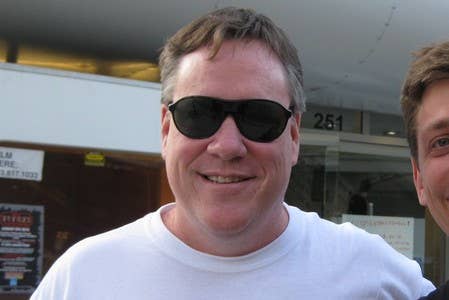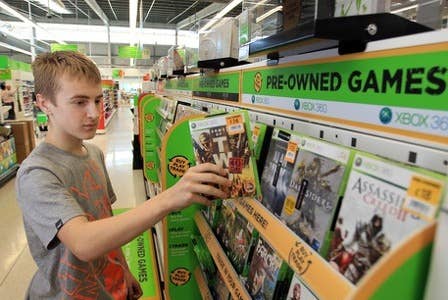Retail's Pre-Owned Peacekeeper
Meet EKG, the used games retailer giving 10% of second hand sales to publishers
Pre-owned games are a problem. Consumers love them, publishers hate them and retailers are making a hefty profit on them. The obvious solution is more online passes, more digital publishing, but new site EKG thinks the answer is money, and more specifically handing it over to the publishers every time a pre-owned game gets sold.
"It's such a great industry, and right now, for the last couple of years, publishers are at war with retail, consumers are at war with publishers, it shouldn't be this way," explained Mike Kennedy, EKG CEO.
"We should worship the ground that these publishers and developers walk on. And not hate them so much."
The idea behind EKG is simple. They sell used games, the publishers get a 10 per cent of the sale price.
"Why can't we just change things so it works for everybody?" Kennedy asked.
"That's what we're trying to do, and there's a lot of people that think it can't be done, and they may be right. But it's worth a try, this should have been done years ago."
The site has been in the works since 2010, and was originally called Postal Gamer. One cease and desist letter from the maker of the game later it became EKG, and launched just weeks ago. Kennedy previously launched GameGavel.com, an eBay for games, and has good relationship with the industry. He said he's "always trying to channel that into something that we hope will make the industry better."
"We don't want to kill off bricks and mortar retail, but that's right now potentially going to disappear if something doesn't change"
"It's going to take us a lot of work to really turn the tides of this thing, because you've got GameStop in the US, $3 billion almost in used games, and so all things being equal if we were doing that there'd be $300 million or $400 million going back to the publishers free and clear, at no cost to them."
It's not about taking on specific retailers, said Kennedy. It's about changing the way retail works before the publishers find more damaging ways to do it.
"We don't want to kill off bricks and mortar retail, I love it, I love going into the stores and looking at the kiosk, but that's right now potentially going to disappear if something doesn't change."
And there's no catch for the publishers, with Kennedy offering quarterly sales reports so that they can see how a product is doing through its whole life cycle.
"We've been told by one major publisher that the data's almost more important than the revenue from the used games."

You'd think the publishers would be sending Kennedy muffin baskets on a daily basis, but he admits it's been harder than he expected. While they're happy to talk behind closed doors (he mentions Sony and Nintendo specifically) and all they need to do is accept a cheque, they're nervous about coming out in support of EKG. Or at least being first.
"Nobody has really said no, nobody wants to eliminate this if it should turn into something, but at the same time they're hesitant to really get on board. We hoped they would by saying '100 per cent, we're behind you, let's partner up, let's turn the Titanic, let's right the wrongs and let's be behind you to do it.'"
Publishers are concerned about being singled out by GameStop. They're scared of the retailers reaction, and Kennedy admits they're probably right to be.
"We don't want to jeopardise publisher's relationships with the Walmart and the Best Buys of the world. GameStop we're not as worried about," he teased.
"And from what we've been told they've tried to do things with GameStop but it really doesn't... they control a lot, I'll just say that. And they're not as easy to make a change because... I don't know if they could emulate our model, with all the stores and all the overhead they've got."
Kennedy is still hoping that by E3 in a few weeks EKG will be able to announce that at least half a dozen publishers are supporting the scheme, although even then the wording is proving tricky.
"Right now that's all we're asking them to do, we just want them to say 'yes, we'll participate in it, we'll take your money.' We boil it down to that. We're not really calling it an endorsement at this time, just because of what that might appear to GameStop. But to have them say that they're participating in our business model, taking our money when we send them the cheques, why wouldn't they do that?"
Another sticking point when it comes to revolutionising the retail model is some of the measures publishers have implemented already, like online passes, and those that are rumoured for the future, like the suggestion that consoles will need an always-on online connections.
EKG will deal with the first problem simply. Publishers will not get their 10 per cent on the games that have an online pass system. As this includes the majority of the big sellers, Battlefield 3, Mass Effect, Uncharted: Drake's Deception, a cynic might suggest it's just a way for EKG to avoid big bills. But Kennedy said it's about influencing the publishers.
"We just want publishers to say 'yes, we'll participate in it, we'll take your money'"
"I would love to tell our buyers if you buy a game from EKG that you're guaranteed the full game, at the right price. You're still going to pay $5 or $10 less for it and you're still going to get the complete game."
"I'm not asking publishers to give that up at this point. Although it might be something that if this thing were to grow quickly it might be a demand that we would make," he suggests.
"If they're getting 10 per cent of all used game sales and if we get significant enough that there's a lot of used games that are changing hands through our market, is it worth it to them to forego the 10 per cent on the games that require it?"
The other issue, and one that could signal the end of EKG before it's even out of nappies, are the rumours of the next-generation coming with always online connections that will render second-hand games unplayable.
"Well if they're [the format holders] worried about pissing off GameStop I think they've already done it," he jokes.
"I don't think anyone has confirmed that yet and from what I have heard, sort of on the back-end, is it may not be true. And we hope it's not true, obviously."
True or not, those rumours are affecting EKG's ability to get any sort of support from the investment community. At one point they were projecting that, if the site took off, publishers could expect to see $200 million to $300 million in the first three years.
"Our original plan was to get all these publishers on board and go out and get this thing funded at a significant level, because face it, we're taking on a $10 billion company with a revolutionary idea that if it works, I think could quickly chip away at that empire."
That dream is over, at least for now. Kennedy won't even make a new projection at this point. The focus on digital, and now the rumours of next-gen, mean that's just not an option anymore.
"Who the hell is going to invest in a website that is going to be mailing games back and forth through the post office?"
Survival will come down to consumer support. EKG has some great ideas, like including a pre-paid envelope in the games they sell that allows gamers to trade in their games at EKG easily. This way EKG can sell the same game, four, five times over.
Certainly if it was down to enthusiasm, or even a love of games, Kennedy could make the thing a success single-handedly. As it stands it's clear that this E3 will be a watershed for the company, the moment when publishers decide whose side they're on. The guy who wants to give them money for nothing? Or the retail giant that buys their product. No one can pretend it's an easy call.
"We want to breathe new life into this dying retail business," Kennedy says. Asked if he expects anyone to try and copy the model, he laughs.
"I think you've got to be sort of nuts to do what we're doing"

